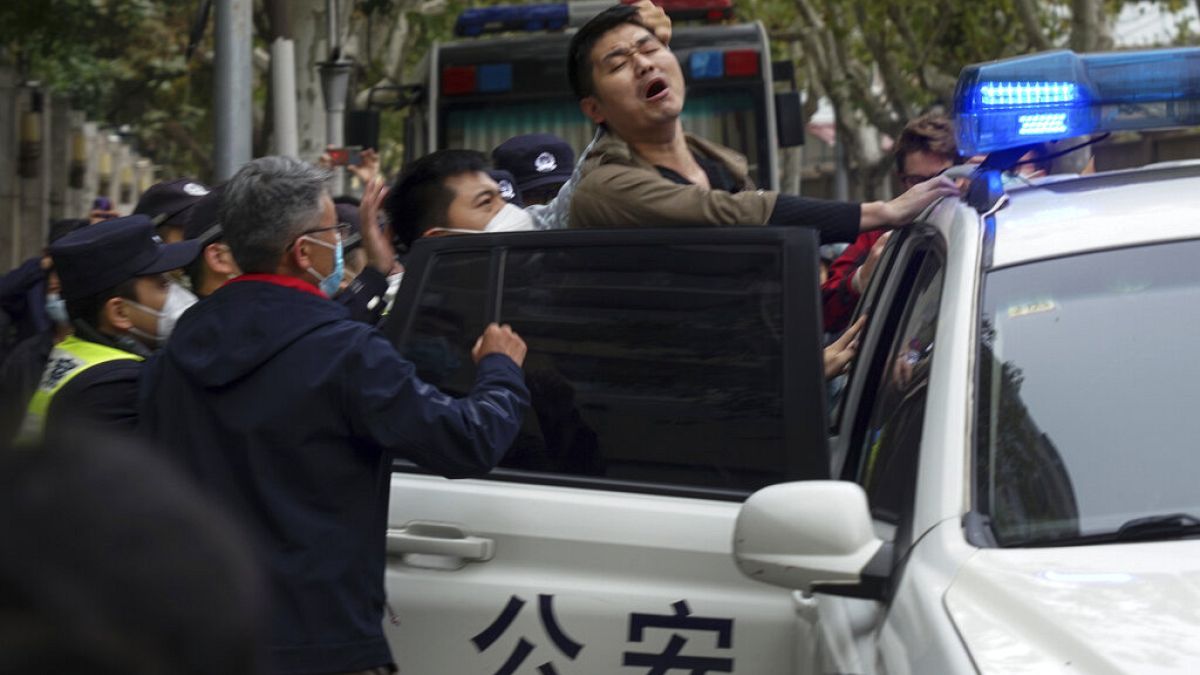Security forces in China continued to detain civilians on Monday after protests flared up across the country last weekend. Demonstrators are calling for an end to COVID-19 lockdowns and for President Xi Jinping to resign. While some measures have eased, China’s zero-tolerance policy still stands.
Police officers in Shanghai were filmed on Monday stopping civilians and checking their smartphones for footage of anti-lockdown protests.
According to local reports, security forces ordered people to delete evidence of the protests and were seen leading at least three people away from the scene of an earlier demonstration.
It comes as protesters marched in various Chinese cities last weekend calling for an end to the government's strict zero-covid strategy and greater political freedoms.
Some even called for the resignation of long-time President Xi Jinping, who is now in his third term.
This unrest follows a deadly fire last week in Urumqi, the capital of northwest China's Xinjiang region. It was the catalyst for public anger, with many blaming Covid lockdowns for hampering rescue efforts.
While authorities have eased some measures in efforts to quell the demonstrations, state censors appear to have largely cleaned Chinese social media of any news on the rallies.
The city government in Beijing announced Monday it would no longer set up gates to block access to apartment compounds where infections are found but made no mention of the fire.
In addition, the southern manufacturing and trade metropolis of Guangzhou, the biggest hotspot in China’s latest wave of infections, announced some residents will no longer be required to undergo mass testing. It cited a need to conserve resources.
While in Urumqi and another city in the Xinjiang region, authorities announced markets and other businesses in areas deemed at low risk of infection would reopen this week and public bus service would resume.
Beijing on Monday accused "forces with ulterior motives" for linking the fire to Covid measures, saying local authorities had "made clear the facts and refuted this information and smears".
A British government minister has denounced the Chinese police's actions as "unacceptable" and "concerning".
Swiss TV Correspondent, Michael Peuker, was briefly held by Chinese police on Sunday, just after a live broadcast at 7:30 pm. He was released a short while later.
A BBC journalist was also arrested on Sunday and was beaten by police while covering the protests in Shanghai.
But China's foreign ministry says that reports of protests in Beijing and Shanghai do not reflect reality and that a BBC journalist who was detained in Shanghai did not present press credentials to local police.
"We have noted that the BBC has issued a statement regarding the event," said Zhao Lijian, Chinese foreign ministry spokesman.
"According to what we have learned, the BBC’s statement does not reflect what actually happened.
"Based on what we have learned from the relevant authorities of Shanghai, the journalist in question did not identify himself as a journalist and did not voluntarily present his press credentials.
"Local law enforcement officials were persuading people at the scene to leave. Those who refused to cooperate were then ushered away" he added.
State-run media published a commentary Monday morning warning against "paralysis" and "battle-weariness" in the fight against Covid -- but stopped far short of calling for an end to the hardline policy.
Ho-fung Hung, a professor of political economy at Johns Hopkins University said the only option for the Communist Party was to crack down, saying it is "unimaginable" that authorities would try to resolve the matter by backing down because it is not Xi's style.
China reported 40,052 domestic Covid-19 cases Monday, a record high for the country but tiny compared to caseloads in the West at the height of the pandemic.
